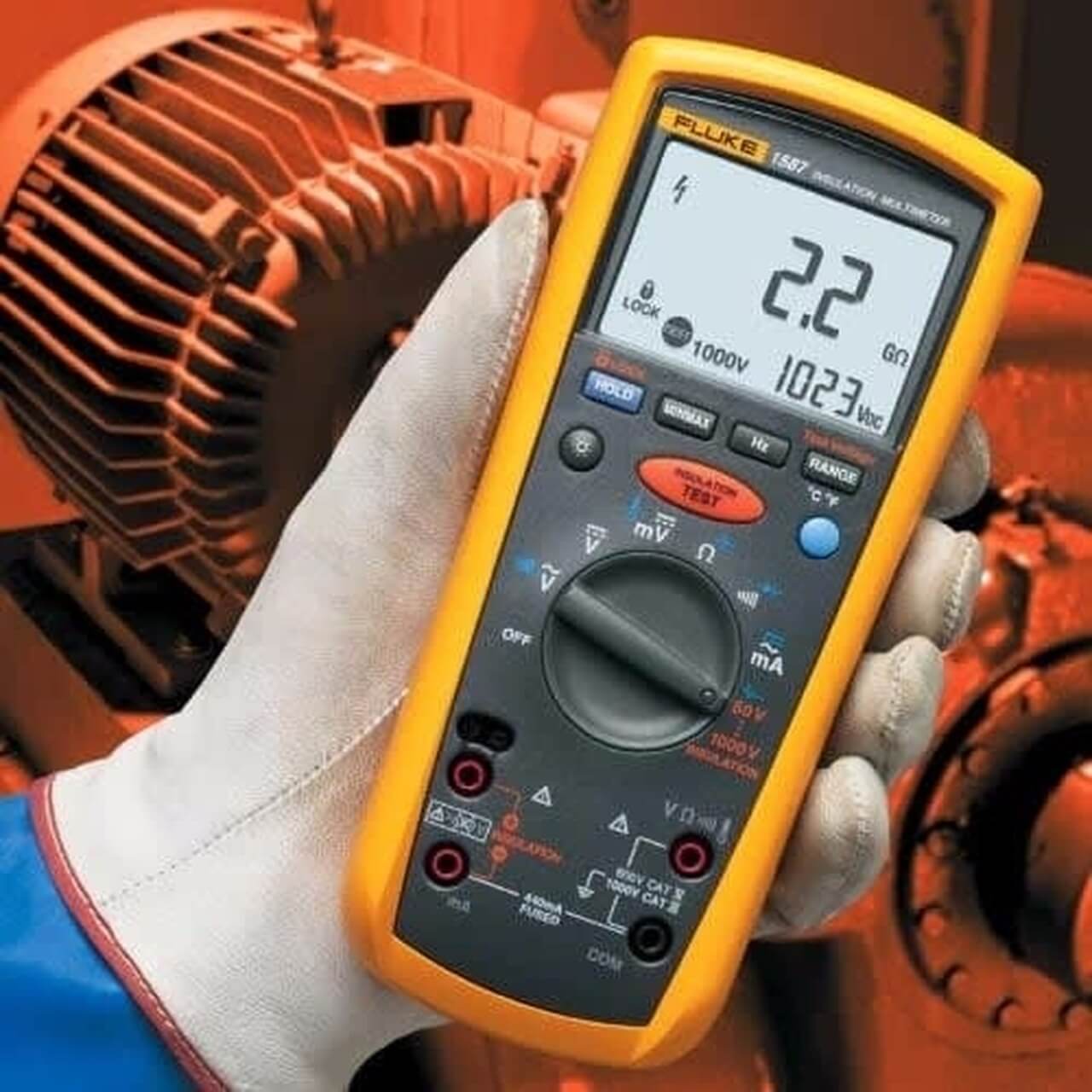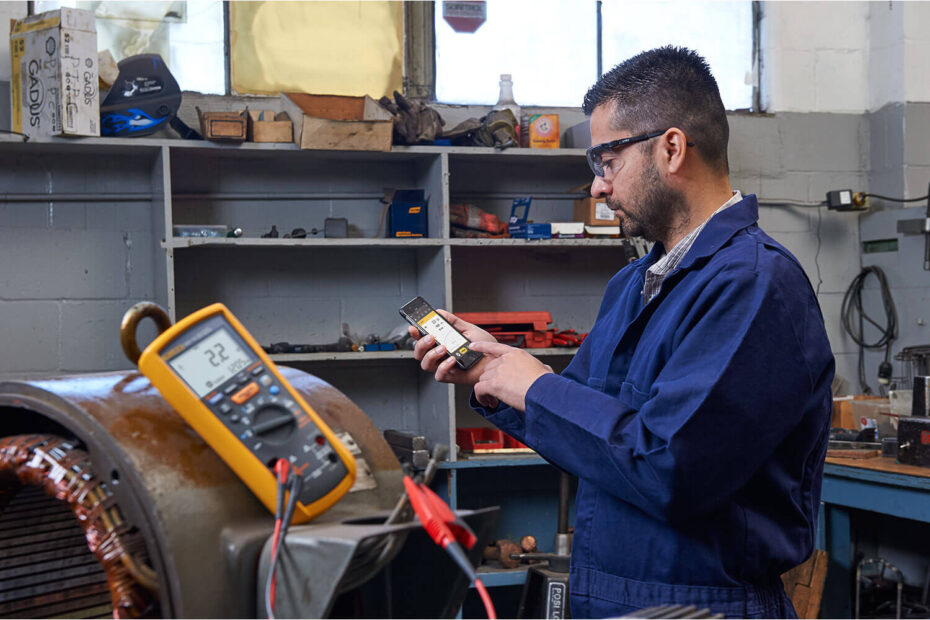What electrician wouldn’t want to carry fewer tools on his heavy belt? As long as he had everything he needed right there—and that’s always the catch.
Fluke tool users had been saying for years that Fluke 1587 should combine an insulation resistance tester and a DMM, and make it small. They said it would be their central test unit, the one they used every day.
As it was, these electricians knew the importance of testing insulation, both at installations and for regular maintenance. Still, the tool usually only came out when needed, for troubleshooting failures. Because, more often than not, they only had one insulation tester, shared among a team. It was bulky, expensive, and probably back in the shop. It might even be hand-cranked.
Fluke 1587 is Feature-Rich
The right technology has finally come along. Fluke engineers have become adept at making complex tools easy to use and easy to carry in the palm of your hand. The new Fluke 1587 and 1577 Insulation Multimeters combine all the functions of an advanced multimeter with the most frequently used features of an insulation tester—for less cost than some insulation testers alone and half the size and weight.
Their small size is made possible by higher circuit densities and advances in safety design. For example, both meters are 600 V CAT IV and 1000 V CAT III overvoltage rated. They’re designed for use on service entrances up to 600 V, and on PWM inverter dc buses up to 1000V. They automatically disable insulation testing if connected to a live circuit with more than 30 volts. And following insulation resistance testing, the meters discharge all capacitive voltage from the equipment user test to help prevent accidental shocks.
Other advances include a remote activation probe that enables one-handed insulation testing via a voltage trigger on the probe handle.
Fluke 1587 provides insulation resistance testing up to 2 GΩ, with five output voltages ranging from 50 V to 1000 V, while Fluke 1577 tests up to 600 MΩ of resistance with 500 or 1000 V. Both meters also offer a low-ohms function for continuity and ground connection testing.
This new category of test tool is ideal for electricians who work on motors, switchgear, and cabling and for HVAC/R technicians who work with compressors. To make the advanced model even more flexible, Fluke engineers added a low-pass filter for accurately measuring variable frequency drives, Min/Max, temperature, diode test, frequency, and capacitance.
Note: The goal is to help electricians do more tests in less time, provide better service to the customer and get more accurate, reliable results from more comprehensive tests.
What the Fluke 1587 Insulation Tester Multimeter can do?
| Measurement Troubleshooting | Applications |
| Volts ac | • Line voltage level • Phase voltage unbalance |
| Volts ac, with low-pass | • “Envelope” voltage measurement on PWM motor drive output |
| Volts dc | • Battery voltage • Voltage on dc power supplies used in electronic equipment • DC buses on motor drives and uninterruptible power supplies |
| Amps with current clamp | • Running current • Current unbalance |
| Amps, in-line | • Low current control circuits such as 4 to 20 mA or alarm systems |
| Ohms | • Coil resistance in contactors, relays • Contact resistance in switches, circuit breakers • Use to check Resistance Temperature Detectors (RTD’s)or thermistors • Check strain gauges |
| Continuity | • Verify conductor integrity • Connection integrity • Check fuses |
| Insulation resistance testing | • Check for conductor insulation degradation to bonded conduit • Check for insulation degradation between conductors sharing a conduit or raceway • Check for motor winding insulation degradation to bonded frame • Check for insulation degradation in transformers |
| Temperature* | • Check air temperature in HVAC systems • Check surface temperature of motor frames • Check surface temperature of switchgear and transformer enclosures • Corroborate other thermometers, thermostats or temperature transmitters |
| Hertz | • Check generator output • Check pulse output flow sensors • Check pulse output of optical encoders • Check “six step” motor drive output frequency |
| Hertz, with low-pass | • Check PWM motor drive output frequency |
| Capacitance | • Verify the proper capacitance of • Filter capacitors on dc power supplies • Motor start and run capacitors |
| Diode | • Check rectifier diodes for shorts and opens in power supplies, motor drives and UPS’s/LED’s |
| Min/Max/Avg recording | • Check for ac line voltage sags and swells • Use on current setting to track Max load • Track temperature excursions |
| Other | • Pressure, with an appropriate accessory like PV350 |

Why Test Insulation?
Electrical insulation includes the entire complex system of cable insulation, bushings, and spacers within a conduit, motors, and general equipment. Low insulation resistance indicates that current is leaking through the insulation. That can cause heat build-up, which in turn causes the insulation to degrade even faster and eventually fail. Leaking current can cause over-current protection devices to trip and motors and transformers to overheat, and is just plain unsafe and inefficient.
Insulation problems are usually caused by improper installation, environmental contamination, mechanical stress or age. Insulation testing can easily be combined in with regular maintenance, to identify degradation before failure and during installation procedures to verify system safety and performance. When troubleshooting, insulation resistance testing can be the missing link that enables you to get a unit back into operation the easy way, by simply replacing a cable.
Insulation testers apply a dc voltage across an insulation system and measure the resulting current. This allows them to calculate and display the resistance of the insulation. Typically, the test verifies high insulation resistance between a conductor and ground or high insulation resistance between adjacent conductors. Two common examples include testing motor windings for insulation from the motor frame and checking phase conductors for resistance from bonded conduit and enclosures.
Conclusion
The Fluke 1587/1577 is the perfect tool for insulation testing and regular maintenance for electricians. It can do both for you, saving you time, hassle and money. If you’re looking to buy an insulation tester, be sure to contact us! We are an authorized Fluke distributor in Bangalore, Karnataka. We can help you find the right tool for your needs and configure a quote for you.
